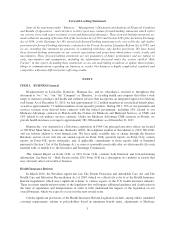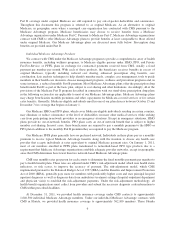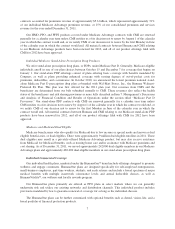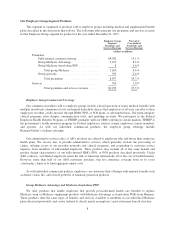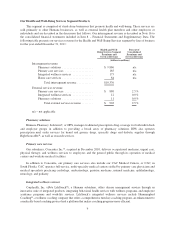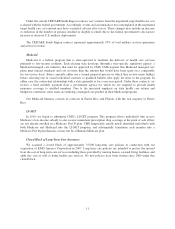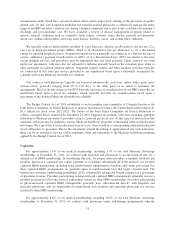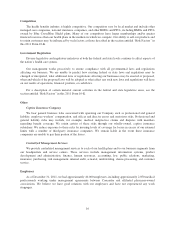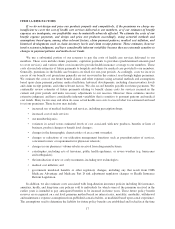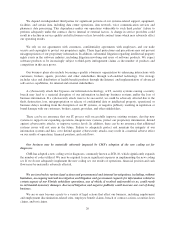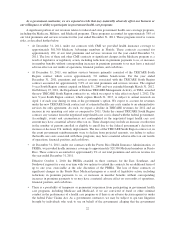Humana 2011 Annual Report Download - page 22
Download and view the complete annual report
Please find page 22 of the 2011 Humana annual report below. You can navigate through the pages in the report by either clicking on the pages listed below, or by using the keyword search tool below to find specific information within the annual report.
Membership
The following table summarizes our total medical membership at December 31, 2011, by market and
product:
Retail Segment Employer Group Segment
(in thousands)
Individual
Medicare
Advantage
Individual
Medicare
stand-
alone PDP
Individual
Commercial
Fully-
insured
commercial
Group
Group
Medicare
Advantage
and stand-
alone PDP ASO
Other
Businesses Total
Percent
of Total
Florida .............. 362.1 169.9 80.5 149.7 19.2 70.1 0 851.5 7.6%
Texas ............... 118.6 204.1 74.7 266.8 5.1 108.7 0 778.0 7.0%
Kentucky ............ 43.1 46.0 21.4 99.0 29.4 513.1 0 752.0 6.7%
Illinois .............. 64.5 82.7 37.8 170.7 5.6 118.9 (a) 0 480.2 4.3%
Ohio ................ 51.0 83.7 6.3 52.0 122.4 152.8 0 468.2 4.2%
Wisconsin ........... 44.4 48.8 15.4 82.8 12.3 142.9 0 346.6 3.1%
Georgia ............. 53.7 53.4 41.6 82.3 6.6 44.6 0 282.2 2.5%
Missouri/Kansas ...... 69.9 134.0 14.1 43.6 6.0 8.9 0 276.5 2.5%
Tennessee ........... 87.8 70.1 17.5 36.6 2.7 31.8 0 246.5 2.2%
California ........... 17.2 215.9 3.1 0.2 0 0 0 236.4 2.1%
Louisiana ............ 91.3 32.7 14.0 43.6 7.2 24.1 0 212.9 1.9%
Indiana .............. 42.1 67.9 5.9 20.3 3.5 47.9 0 187.6 1.7%
North Carolina ........ 62.1 91.4 6.4 0.2 1.9 0 0 162.0 1.5%
Michigan ............ 35.1 80.9 12.5 15.4 6.2 9.3 0 159.4 1.4%
Virginia ............. 57.8 72.9 3.7 0 2.5 0 0 136.9 1.2%
Arizona ............. 36.2 39.8 16.3 24.5 3.5 6.7 0 127.0 1.1%
Colorado ............ 21.8 35.4 34.1 19.2 5.1 0.4 0 116.0 1.0%
Military services ...... 0 0 0 0 0 0 1,722.9 1,722.9 15.4%
Military services
ASO.............. 0 0 0 0 0 0 1,305.2 1,305.2 11.7%
Medicaid and other .... 0 0 0 0 0 0 614.2 614.2 5.5%
LI-NET ............. 0 0 0 0 0 0 73.5 73.5 0.7%
Others .............. 381.6 1,010.8 87.9 73.3 55.6 39.7 0 1,648.9 14.7%
Totals ............... 1,640.3 2,540.4 493.2 1,180.2 294.8 1,319.9 3,715.8 11,184.6 100.0%
(a) Includes 27,600 Medicare Advantage ASO members.
Provider Arrangements
We provide our members with access to health care services through our networks of health care providers
with whom we have contracted, including hospitals and other independent facilities such as outpatient surgery
centers, primary care physicians, specialist physicians, dentists, and providers of ancillary health care services
and facilities. These ancillary services and facilities include ambulance services, medical equipment services,
home health agencies, mental health providers, rehabilitation facilities, nursing homes, optical services, and
pharmacies. Our membership base and the ability to influence where our members seek care generally enable us
to obtain contractual discounts with providers.
We use a variety of techniques to provide access to effective and efficient use of health care services for our
members. These techniques include the coordination of care for our members, product and benefit designs,
hospital inpatient management systems and enrolling members into various disease management programs. The
focal point for health care services in many of our HMO networks is the primary care physician who, under
contract with us, provides services to our members, and may control utilization of appropriate services by
directing or approving hospitalization and referrals to specialists and other providers. Some physicians may have
12



